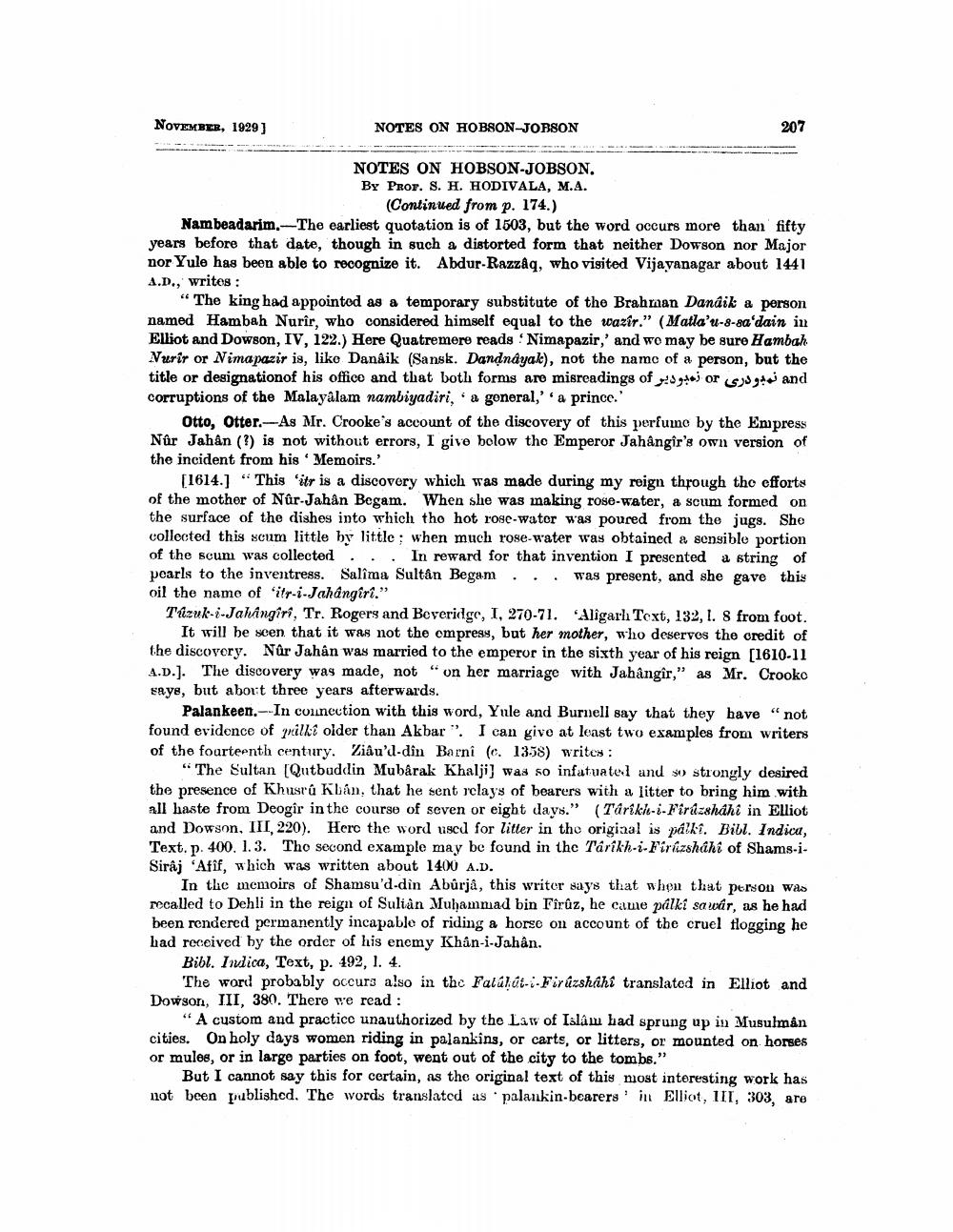________________
NOVEMBER, 1929)
NOTES ON HOBSON-JOBSON
207
NOTES ON HOBSON-JOBSON. BY PROF. S. H. HODIVALA, M.A.
(Continued from p. 174.) Nambeadarim.--The earliest quotation is of 1503, but the word occurs more than fifty years before that date, though in such a distorted form that neither Dowson nor Major nor Yule has been able to recognize it. Abdur-Razzaq, who visited Vijayanagar about 1441 A.D., writes :
“The king had appointed as a temporary substitute of the Brahman Danáik a person named Hambah Nurir, who considered himself equal to the wazir." (Matla'u-8-8a'dain in Elliot and Dowson, IV, 122.) Here Quatremere reads Nimapazir,' and we may be sure Hambah Nurir or Nimapazir is, like Danaik (Sansk. Dandnayak), not the name of a person, but the title or designationof his office and that both forms are misreadings of or sug and corruptions of the Malayalam nambiyadiri, a general,'' a prince.
Otto, Otter.-As Mr. Crooke's account of the discovery of this perfume by the Empress Nür Jahan (?) is not without errors, I give below the Emperor Jahangir's own version of the incident from his Memoirs.'
[1614.] “This 'itr is a discovery which was made during my reign through the efforts of the mother of Nûr-Jahan Begam. When she was making rose-water, a scum formed on the surface of the dishes into which the hot rose-water was poured from the jugs. She collected this scum little by little ; when much rose-water was obtained a sensible portion of the scum was collected ... In reward for that invention I presented a string of pearls to the inventress. Salima Sultan Begam ... was present, and she gave this oil the name of 'itr-i-Jahangiri." Taizuk-i-Jahangiri, Tr. Rogers and Beveridge, I, 270-71. Aligarh Text, 132, 1. 8 from foot.
It will be seen that it was not the ompress, but her mother, who deserves the credit of the discovery. Nûr Jahan was married to the emperor in the sixth year of his reign [1610-11 A.D.). The discovery was made, not " on her marriage with Jahangir," as Mr. Crooko Frye, but about three years afterwards.
Palankeen.--In connection with this word, Yule and Burnell say that they have “not found evidence of pilki older than Akbar". I can give at least two examples from writers of the fourteenth century. Ziau'd-din Barni (c. 1358) writes:
“The Sultan Qutbuddin Mubarak Khalji) was so infatuated and so strongly desired the presence of Khusrų klán, that he sent relays of bearers with a litter to bring him with all haste from Deogir in the course of seven or eight days." (Tarikh-i-Firázsháhi in Elliot and Dowson, III, 220). Here the word uscd for litter in the original is palki. Bibl. Indica, Text. p. 400. 1.3. Tho second example may be found in the Tarikh-i-Firizsháhi of Shams-i. Siraj Afif, which was written about 1400 A.D.
In the memoirs of Shamsu'd-din Abúrjá, this writer says that when that person was recalled to Dehli in the reign of Sulian Muhammad bin Firûz, he came pálki sawar, as he had been rendered permanently incapable of riding a horse on account of the cruel flogging he had received by the order of his enemy Khân-i-Jahân.
Bibl. Indica, Text, p. 192, 1. 4.
The word probably occurs also in the Fataldi-:-Firüzsháhi translated in Elliot and Dowson, III, 380. There we read :
"A custom and practice unauthorized by the Law of Islam had sprung up in Musulman cities. On holy days women riding in palankins, or carts, or litters, or mounted on horses or mules, or in large parties on foot, went out of the city to the tombs."
But I cannot say this for certain, as the original text of this most interesting work has not been published. The words translated as palankin-bearers' in Elliot, III, 303, are




